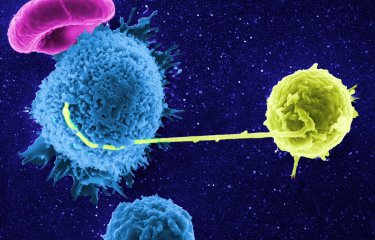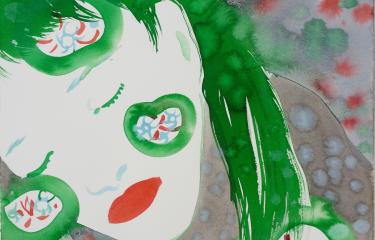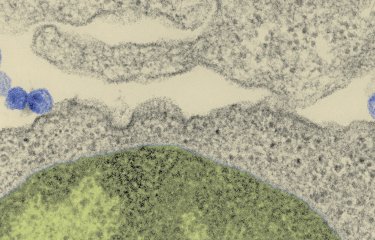A young woman now aged 18 and a half, who at birth was HIV-infected via mother-to-child transmission (during pregnancy or at delivery), is in virological remission, despite not having taken any antiretroviral therapy for the last 12 years. Monitored in the French ANRS pediatric cohort, this young woman seems to have benefited from the treatment that was initiated shortly after her birth and stopped approximately six years later. Her case suggests that long-term remission after early treatment is possible in children infected by HIV since birth, as demonstrated in adults in the ANRS VISCONTI study.
This first case in the world of long-term remission in a child will be presented as an oral communication by Dr Asier Sáez-Cirión (HIV, Inflammation and Persistence Unit, Institut Pasteur, Paris) at the 8th International AIDS Society (IAS) Conference on HIV Pathogenesis, Treatment and Prevention to be held from 19 to 22 July in Vancouver, Canada. This work, supported by the ANRS, was conducted by research teams at the Institut Pasteur, Inserm and Paris university hospitals.
Since July 2015, these results has been published in The Lancet HIV, on December 9, 2015.
A French study has shown, for the first time, that long-term remission from HIV infection can be achieved in a child infected during the perinatal period, after discontinuation of antiretroviral therapy begun during the first months of life. This observation concerns a girl born in 1996 and monitored in the French ANRS pediatric cohort. She was infected at the end of pregnancy or at childbirth when her mother had an uncontrolled viral load (quantity of virus in the blood). Despite zidovudine prophylaxis for six weeks, the child was nonetheless HIV-positive one month after birth. Two months later, following discontinuation of the prophylactic treatment, she had a very high viral load, which prompted initiation of treatment with four antiretroviral drugs.
This treatment was continued until the child was almost six years old. She was then lost to follow-up and her family decided to stop the antiretroviral therapy. On examination one year later by her medical team, she was found to have an undetectable viral load (<50 copies of HIV RNA per mL of blood). Her doctors then decided not to resume treatment.
Twelve years later, now aged 18 and a half, she has a viral load that is still undetectable, as measured with a particularly low detection threshold (<4 copies of HIV RNA per mL of blood), despite never having resumed antiretroviral treatment. Her CD4 cell count has remained stable throughout this period.
Dr Asier Sáez-Cirión, of the HIV, Inflammation and Persistence Unit at the Institut Pasteur in Paris, notes that “This girl has none of the genetic factors known to be associated with natural control of infection. Most likely she has been in virological remission for so long because she received a combination of antiretrovirals very soon after infection.”
This case is clinically, immunologically and virologically similar to that of the adult patients of the study ANRS VISCONTI who, after a median of three years on antiretroviral therapy, initiated at primary infection (ie, during the first few months after infection), showed virological and immunological control of their infection for a median of 10 years, without having resumed antiretrovirals[1]. Started very early, antiretrovirals may limit the constitution of reservoirs of HIV and preserve the body’s immune defenses.
Dr Sáez-Cirión explains that “With this first, highly documented case of this young woman, we provide the proof of concept that long-term remission is possible in children, as in adults. However, these cases are still very rare. A similar case of an HIV-infected infant treated early was described in the United States (the so-called ‘Mississippi baby’), but remission lasted just 27 months after antiretroviral therapy was stopped. Treatment discontinuation is therefore not recommended in adults or children outside clinical trials.”
ANRS Director Professor Jean-François Delfraissy points out that “This prolonged remission in a child born seropositive is a major clinical observation that opens up new research perspectives. This remission, however, should not be equated with a cure. This young woman is still infected by HIV and it is impossible to predict how her state of health will change over time. Her case though constitutes a strong additional argument in favor of initiation of antiretroviral therapy as soon as possible after birth in all children born to seropositive mothers.”
Source
HIV-1 virological remission for more than 11 years after interruption of early initiated antiretroviral therapy in a perinatally-infected child.
Pierre Frange1,2,3, Albert Faye4,5, Véronique Avettand-Fenoël1,2, Erianna Bellaton6, Diane Descamps7,8, Mathieu Angin9, Sophie Caillat-Zucman10,11, Gilles Peytavin12,13, Le Chenadec J14,15, Josiane Warszawski14,15, Christine Rouzioux1,2 and Asier Saez-Cirion9, on behalf of the French ANRS EPF-CO10 Pediatric Cohort. . 8th IAS Conference on HIV Pathogenesis, Treatment and Prevention, July 19-22, Vancouver (Canada), abstract n°MOAA0105LB, oral communication, July 20th, 2015.
1 Laboratoire de Microbiologie clinique, Assistance Publique – Hôpitaux de Paris (AP-HP), Hôpital Necker – Enfants malades, Paris, France;
2 EA7327, Université Paris Descartes, Sorbonne Paris Cité, Paris, France;
3 Unité d’Immunologie, Hématologie et Rhumatologie pédiatriques, AP-HP, Hôpital Necker – Enfants malades, Paris, France;
4 Service de Pédiatrie générale, AP-HP, Hôpital Robert Debré, Paris, France;
5 Université Paris 7 Denis Diderot, Paris Sorbonne Cité, Paris, France;
6 Service d’Hématologie pédiatrique, AP-HP, Hôpital Robert Debré, Paris, France;
7 Laboratoire de Virologie, AP-HP, Hôpital Bichat – Claude Bernard, F-75018, Paris, France;
8 INSERM UMR1137 IAME, Université Paris Diderot, F-75018, Paris, France;
9 Institut Pasteur, Unité HIV inflammation et persistance, Paris, France;
10 Laboratoire d'Immunologie, AP-HP, Hôpital Robert Debré, Paris, France;
11 INSERM UMR1149, Université Paris Diderot, Paris, France;
12 Laboratoire de Pharma-Toxicologie, AP-HP, Hôpital Bichat, F-75018, Paris, France;
13 IAME, INSERM UMR 1137, Université Paris Diderot, Sorbonne Paris Cité, Paris, France;
14 Service d’Epidémiologie et de Santé publique, AP-HP, Hôpital Bicêtre, Le Kremlin Bicêtre, France;
15 INSERM U1018, Université Paris Sud, Le Kremlin Bicêtre, France
[1] Sáez-Cirión A, Bacchus C, Hocqueloux L Avettand-Fenoel V, Girault I, Lecuroux C, Potard V, Versmisse P, Melard A, Prazuck T, Descours B, Guergnon J, Viard JP, Boufassa F, Lambotte O, Goujard C, Meyer L, Costagliola D, Venet A, Pancino G, Autran B, Rouzioux C; ANRS VISCONTI Study Group. Post-Treatment HIV-1 Controllers with a Long-Term Virological Remission after the Interruption of Early Initiated Antiretroviral Therapy, PLoSPathog. 2013 Mar;9(3):e1003211doi: 10.1371/journal.ppat.1003211. PLoSPathog. 2013;9(3):e1003211





